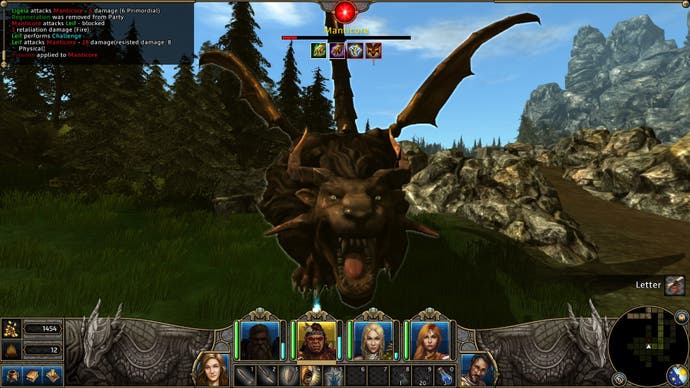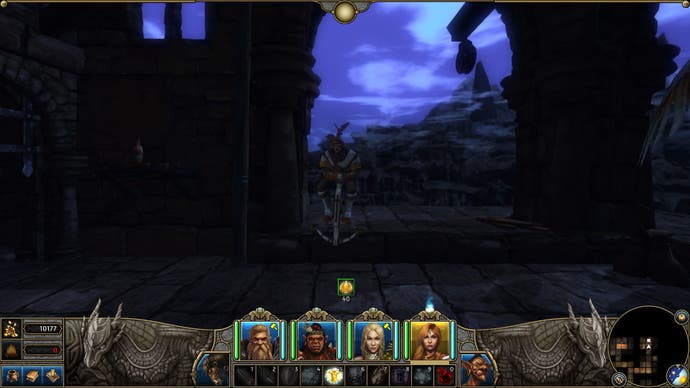Might & Magic 10: Legacy review
Misty watercolour memories.
Over the last few years, video games have quietly arrived at a hallowed place where creators - be they hobbyists or fully-fledged professional developers - have begun to look not to motion pictures and literature for inspiration, but to the medium's own history. This has resulted in as much navel-gazing as it has productive introspection, and so for every successful reimagining of a treasured slice of history, there's a franchise reboot or crowd-funded revival whose merits and miscues can be debated ad infinitum.
Nonetheless, many of these projects carry with them a sense of history being preserved and remembered; a feeling of heritage shared between different generations of likeminded people. It is from these roots that Ubisoft and Limbic Entertainment's Might & Magic 10: Legacy has grown.
Taking as its basis the form, structure and events of Might & Magic 6, Legacy is Limbic's attempt to pay homage to the golden age of the western RPG by harking back to its renaissance period. With its grid-based, first-person movement and turn-based combat, Legacy is not only unapologetically old-school but gleefully so. It rarely deigns to hold your hand or artificially cordon off areas of its largely open world that might be too tough for your low-level adventurers. Instead, it bids you to explore and to poke its fierce-looking fauna with a stick to see what manner of numbers pop out of its head - and whether those it elicits from your adventurers in return are too large to be successfully managed in a turn-based battle to the death.

Legacy also dispenses with certain narrative niceties that the genre has become preoccupied with - like why, in a town full of retired heroes, nobody has seen their way to venturing down the well to deal with the giant spider infestation - instead focusing on placing your band of four adventurers front and centre of every problem to be solved and menace to be thwacked. A great deal of the joy to be found in Might & Magic 10: Legacy, then, comes from the gentle fostering of this suck-it-and-see approach and revelling in its egocentricity.
Loot-stuffed chests sit ripe for the plunder in the middle of field and forest, even as brigands, manticores and elementals patiently await your arrival in dungeons all across the Agyn Peninsula. In towns, NPCs stand in perpetuity with nary a pretence of a daily routine as they remain rooted to the spot and steadfast in their purpose of doling out quests, sharing local gossip or offering some service or trade to your motley band of adventurers. Fittingly, your ultimate goal is simple and unassuming, which affords plenty of opportunity to get delightfully waylaid along the way and embroiled in all manner of quests and errands, from those that span a few minutes to others that slowly unravel over several hours.
With towns full of people whose problems only you can solve and a wider world to be mapped and explored, your adventurers are key and so, by extension, is the character creation process. A good character creation toolset can provide hours of entertainment in itself, and while Legacy's initially appears obtuse, it ultimately offers you the opportunity to plan the long-term development of your characters and assess how best to complement each party member with the other three. For newcomers, there's a balanced default party to quickly get you started, but true understanding of the numerous powers, spells and abilities comes from the painstaking process of manually selecting members from the four available races, assigning them one of three race-specific classes and forecasting their long-term progress.

It's worth spending the time to get to grips with the various passive perks, weapon masteries and mana-fuelled abilities because, ultimately, that's what your party of adventurers boils down to: a collection of powers assigned to hotkeys that determine your effectiveness in combat and inform the extent of your role-playing. Combat defines the Legacy experience, which in its most basic form is a series of excursions to dungeons, temples, forests and plains to slay beasts and cart the spoils of conquest back to town - spoils with pleasing names like Fiery Pirate Crossbow of Vitality or Arcane Warding Winged Ring of Insomnia. Then it's a question of retooling, restocking and recruiting hirelings before heading back out into the world to carve a path to whatever needs to be bashed into submission next. Character levelling is largely handled on the fly out in the field, but every so often a character will reach an ability cap that requires an expert to be sought out in order to elevate their mastery level.
Occasionally, combat boils down to spamming the standard attack key until whatever is in front of you falls down dead, but more often than not it requires a more considered approach. The difficulty level is well-pitched so that battles against groups of minions or larger boss-type enemies become a puzzle to be solved. Here, the order and abilities of your adventurers need to be carefully managed and consideration given to the next three or four moves to ensure, for example, that the party member charged with drawing aggro will be adequately protected by a well-timed magical boost, or that enemy armour is sundered before a critical hit is lined up. It's here that you'll wish for more than 10 quick slots, especially for magic-users whose burgeoning spell lists soon have you referring back to your spell book.
Not every problem is solved by hitting things, though, and sometimes you're required to solve rudimentary puzzles that might involve a riddle or a series of switches that, once negotiated, reveal a new path or a treasure chest (the opening of which invariably leads to more enemies appearing). There are impractically designed forts with secret passages that exist only to hide a lever for another door, and pressure panels that can set off traps or release far-off locks. Usefully, the basic grid-based map can be annotated to mark the location of useful things or record puzzle clues - and it's when you're busy doing this that Legacy's true roots, along with those of the contemporaries that it aims to pay homage to, are most fondly called to mind: those pen-and-paper RPGs, books and board games that taught us the value of assigning combat roles, plundering the bestiary for potential enemy weaknesses and diligently making notes of places to return to.

Unfortunately, not everything is gloriously old-school - as Ubisoft's insistence that the game authenticate through its Uplay platform attests. There's no perceptible benefit to the player in this, just the potential for more complication, as was evidenced a few times when Uplay reported that part of its service was unavailable and so refused to launch the game through Steam. For the most part, Legacy ran without incident and could even be considered pretty, in its own way, but be warned: played on a rig that straddled the medium to recommended settings I experienced numerous instances of pop-in and long loading times, while being stuck in the past with a 32-bit OS meant that texture quality was capped at medium and a host of ambient sounds and voiceovers were unavailable to me.
These considerations have done little to dent my enjoyment, though, and how much you take from Might & Magic 10: Legacy depends on your outlook. The game's much-touted open-development period has led to fans influencing various factors of the game, but it could stand to benefit from some more optimisation work and improvements to the interface, elements of which are unnecessarily fiddly. Happily, not all future improvements will need to come from the developers, as mod support will likely ensure that dedicated fans quickly set about implementing their own changes.
Might & Magic 10: Legacy feels like a pleasant throwback to dungeon crawls of decades past, but its limited scope and combat-heavy focus might put off those pining for the freedom afforded by the more recent Elder Scrolls games, or the wordy character interaction of a Dragon Age. Nonetheless, for those keen on poring over stats and comparing colour-coded loot, it serves as a modern introduction to those games' precursors, delivers a heady blast of nostalgia, and preserves a little slice of history.

